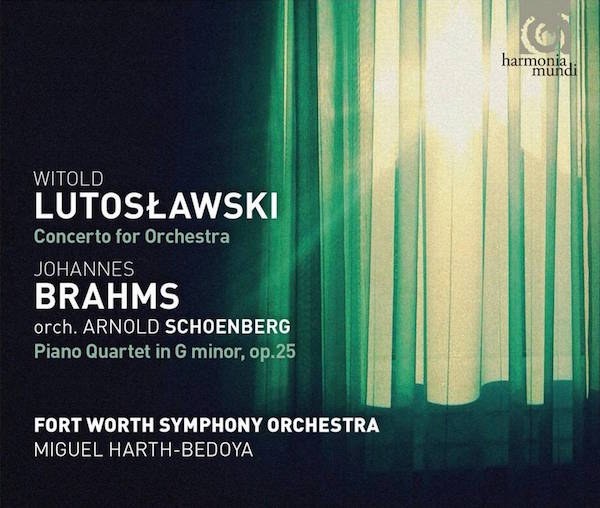Classical CD Review: Fort Worth Symphony plays Lutoslawski and Brahms (Harmonia mundi)
This effort proves that the Fort Worth Symphony Orchestra’s heart is in the right place with the ensemble consistently erring on the right (far) side of caution.

By Jonathan Blumhofer
It’s hard not to cheer for the Fort Worth Symphony Orchestra (FWSO), which, over the last few months, has gone through a couple of doldrums: a much-publicized European tour was suddenly canceled last winter while, at the same time, the musicians of the ensemble were locked in a series of bitter contract negotiations with their management. In January, the latter situation was temporarily resolved and some measure of peace has, for the time being at least, been restored.
One wonders, though, what impact the last situation, especially, might have had on the FWSO’s performances of Witold Lutoslawski’s Concerto for Orchestra and Arnold Schoenberg’s arrangement of Brahms’ G-minor Piano Quartet that make up this disc. Both pieces were taped last October, as the mists began to swirl, and, suffice it to say, it seems as though the orchestra was trying to make a statement with these recordings. At the very least, this effort proves that the FWSO’s heart is in the right place with the ensemble consistently erring on the right (far) side of caution.
In terms of spirit, there’s not much to fault here. Both the Brahms and the Lutoslawski are played with energy, force, and color.
The market isn’t exactly overflowing with recordings of Schoenberg’s orchestral adaptation of the Brahms Quartet and this is about as warmly Romantic a performance as they come. Miguel Harth-Bedoya, the FWSO’s music director, is in no rush most of the time: the first movement unfolds at a decidedly unhurried pace and the big, lyrical tune in the finale fits like a snug blanket. The second-movement Intermezzo is leisurely but never drags and offers some very nice horn playing while the lyrical third delivers its share of shining woodwind solos and pathos. The finale simply rips, especially the passages with wailing brass and bouncing xylophone.
Lutoslawski’s folk-influenced Concerto for Orchestra makes a smart pairing, programmatically. It’s not a terribly familiar piece and it lacks some of the dramatic and melodic appeal of Bartók’s eponymous score, but there’s fine writing in it, including a blistering middle movement and a complex passacaglia-finale.
In the big moments of this performance, the FWSO delivers an impressively muscular reading: the last movement culminates in an awesome, thunderous apotheosis and the second-movement Capriccio offer moments of impressively sturdy lyricism. One might like a broader, bigger sound from the strings in the Intrada’s opening figure, but the orchestra winningly captures the rustic energy of the music. And they wind down, too, in very pleasing fashion over the last half of that movement, crafting an atmosphere of natural delicacy and beauty.
The emotional vitality of these performances is such that one can mostly excuse the performances’ handful of technical shortcomings. The most problematic involve ensemble playing among the strings which, in fast, exposed sections, doesn’t always hold together. In the unforgiving opening of the Lutoslawski’s second movement, for instance, the violins sound like they’re hanging on for dear life — and fingers are starting to slip. Thankfully, things generally come together after the first fifteen or so seconds, but it’s a jarring start to a movement that demands the highest level of virtuosity. Similarly, solo string passages in the Brahms/Schoenberg sometimes sound rushed and thin and the unity of articulation at certain spots (notably in the finale) is questionable. Some of this may be the fault of the recording: while balances throughout are mostly good, there are spots in the Brahms/Schoenberg in which the orchestra suddenly cuts away to reveal soloists sounding a bit distant.
Still, when all is said and done, the FWSO ably does their primary job in both works here — conveying the character and spirit of the music — and they do it impressively. Hopefully this document can win the FWSO new fans and help soothe some of the bitter feelings between the musicians and their management. Good orchestras, after all, are hard to come by and, once an ensemble reaches a certain level, it ought to be sustained and cultivated, not left to wither. The FWSO seems to be standing at such a crossroads. Let’s hope goodwill and common sense prevails and it gets the opportunity to continue down the right path.
Jonathan Blumhofer is a composer and violist who has been active in the greater Boston area since 2004. His music has received numerous awards and been performed by various ensembles, including the American Composers Orchestra, Kiev Philharmonic, Camerata Chicago, Xanthos Ensemble, and Juventas New Music Group. Since receiving his doctorate from Boston University in 2010, Jon has taught at Clark University, Worcester Polytechnic Institute, and online for the University of Phoenix, in addition to writing music criticism for the Worcester Telegram & Gazette.
Tagged: Fort Worth Symphony Orchestra, Harmonia Mundi

